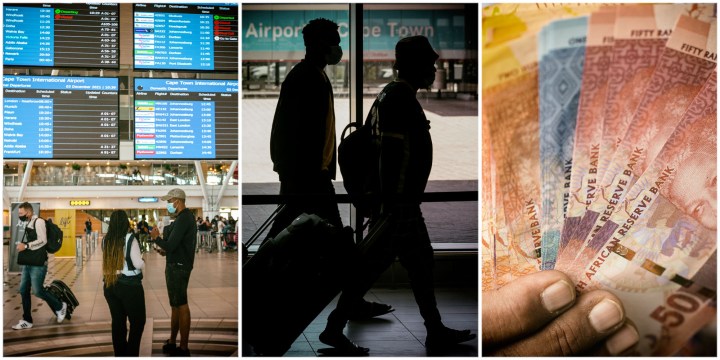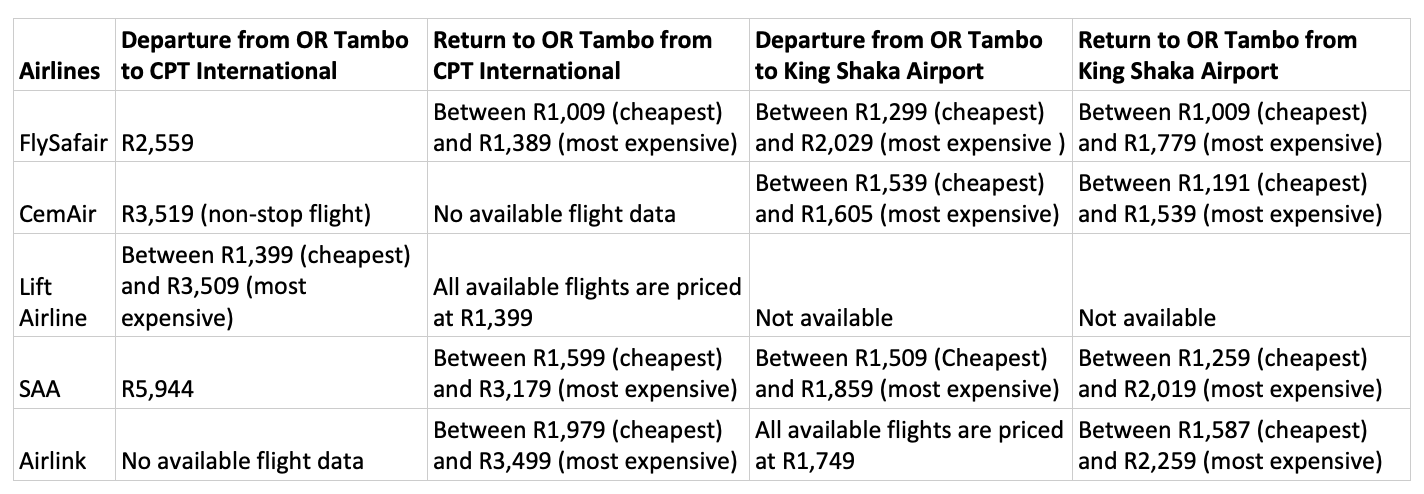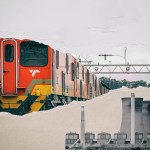SKY-HIGH PRICES
Crunch in the supply of flights pushed up airline ticket prices

Four years ago you could secure a seat on a flight at a reasonable price, even if your travel plans were made at the last minute. But today, try flying at the last minute, especially on a popular local route – you’d be lucky to get a seat. And if you do, the price will be sky-high.
South Africa’s aviation industry has shrunk since Covid burrowed its way into the country in 2020, with fewer airlines flying domestic routes.
SAA, which was restructured under a business rescue process, is no longer a large airline that can supply many seats in the local market. State-owned SA Express and Mango Airlines have been grounded for months. And more recently, Comair – the operator of Kulula and British Airways that provided a big chunk of seats domestically (about 40%) – stopped operating.
These drastic changes have led to a supply crunch, with the Official Airline Guide, a data analytics company, saying that the number of available seats on various routes in southern Africa (mainly South Africa) was down 34.4% in mid-July 2022, compared with the same period in 2019.
Travel patterns under eased Covid restrictions, whether for leisure or business, have increased, intensifying the demand for seats.
The market changes have also led to a spike in the cost of tickets, with airlines being accused of price gouging and taking advantage of travellers who already don’t have many air travel options.
In some cases, travellers have had to shell out between R2,500 and R6,000 for a one-way flight on popular routes such as Johannesburg-Cape Town – the prices of which are up nearly R1,000 from about two years ago.
Even the prices for the Johannesburg-Durban route are elevated in some cases. And with the unrelenting fuel price hikes in recent months, most airlines have passed this on to travellers, making tickets more expensive.
A Johannesburg-based aviation analyst says high ticket prices didn’t start when Comair collapsed, but that prices have been rising through a series of airline failures.
“Pricing pressures tend to normally show when airlines are grounded and seats are taken out of the market. The pressures were already building after the grounding of SAA, SA Express and Mango. But they are now more visible and heightened because Comair’s operations were big, and provided many flight seats to the market,” says the analyst.
Airlines have been at pains to explain the reasons behind the spike in the price of tickets, saying their pricing is based on demand and supply dynamics.
How it works is that airlines determine the cost of a ticket long before the departure date and the first available seats are sold at the lowest price point. As the flight fills up through increased demand, and the departure date draws nearer, prices of the last remaining seats begin to increase.
A Lift Airline representative said: “Last-minute bookings have always been more expensive, but it is understandable that passengers are surprised as they’ve been used to lower prices during Covid. These prices have not been sustainable and would have been a contributor to Comair’s closure.”
Daily Maverick carried out an analysis of various travel booking sites and noticed that tickets tended to be more costly when flight inquiries were made at the last minute for the remaining available seats and closer to the departure date.
For example, the prices of tickets for a 16 July departure from Johannesburg’s OR Tambo Airport to Cape Town International Airport or King Shaka International Airport — the inquiries were made on 14 July — tended to be more expensive than the cost of a return ticket a week later.

If airlines were deliberately pricing their tickets excessively high, the Competition Commission might slap them with a fine. The commission is already investigating complaints from consumers about high ticket prices since the collapse of Comair.
Kirby Gordon, the chief marketing officer at FlySafair, says the belief that airlines are profitable in the current market is outright false.
“There are times when we make money off flights and there are times when we lose money hand-over-fist… running a sustainable airline is about ensuring that the former outweighs the latter,” says Gordon.
The Lift representative supports Gordon’s views. “It is important to consider that airlines everywhere are just recovering from the aftermath of Covid and are now under huge pressure again due to the sharp increase in fuel prices which account for a significant portion of operating costs.”
The goal of local airlines is to add more seats and flight capacity.
Gordon says FlySafair added a new aircraft to the market on 1 July and plans to add another in August.
Lift, which mainly flies the Johannesburg-Cape Town route with three aircraft, plans to add a fourth by September.
Airlink also plans to add two planes to its fleet. DM


















 Become an Insider
Become an Insider
A recent purchase of two tickets (for an international flight) costing around R25k revealed that the airport taxes exceeded R13k, with the actual flight cost just over R5k each (for a 7 hour journey). That actually seems reasonable to me. It’s the taxes that are disproportionate. How can the airport taxes be greater than the cost of the flight to the airline?
Maybe it is time to stop whingeing about prices and just be satisfied that any airline is prepared to offer the service! The fact that Kulula and so many others have gone bankrupt is a sign that they were under-pricing, and got it wrong. The guys still in business are trying to get it right. And if that means we have to pay more, we have to adjust. It is always a willing-seller willing-buyer market, nobody is holding a gun to your head to force you to fly. So you have to decide: is it worth the price?